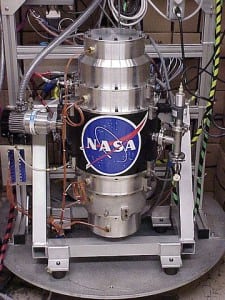
Fly wheels, such as the NASA G2 flywheel module above, are one way to store rotational energy for use by spacecraft or machines on Earth. Photo: NASA
[Via Satellite 08-14-2014] NASA has selected proposals from Amprius of Sunnyvale, Calif. and the University of Maryland, College Park to study new energy storage technologies. The proposals received awards through Phase 2 of the agency’s Game Changing Development (GCD) program. Amprius will study silicon anode based cells for high specific energy Li + systems, and the University of Maryland will focus on garnet electrolyte-based safe, lithium-sulfur energy storage. NASA anticipates the proposals will help cultivate power systems that can survive harsh space environments while cutting battery mass by 50 percent or more.
Phase 1 awards were approximately $250,000, providing four awardees with the funding needed to conduct an eight-month component test and analysis phase. Phase 2 is an engineering hardware phase that provides as much as to $1 million per award for 12 months, and Phase 3 will consist of the prototype hardware development, with up to $2 million per award for 18 months.
“Technology drives exploration, and battery technology is a critical element of that drive,” said Steve Jurczyk, associate administrator for the Space Technology Mission Directorate (STMD) at NASA Headquarters in Washington, D.C. “These next-generation batteries will dramatically improve the availability and affordability of the power and energy required for future exploration missions. The development effort will focus on delivering safe, low mass batteries to enable longer missions deeper into space.”
The post Amprius, University of Maryland Win NASA Funding for Battery Research appeared first on Via Satellite.